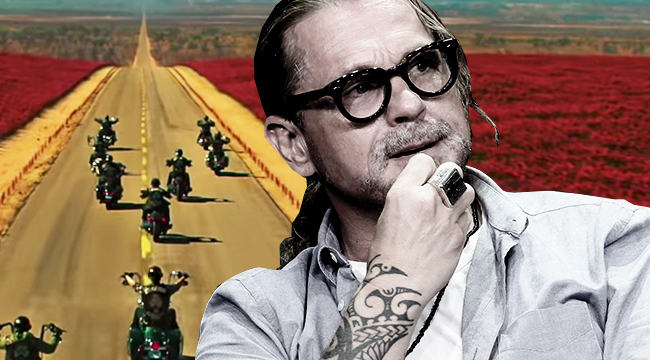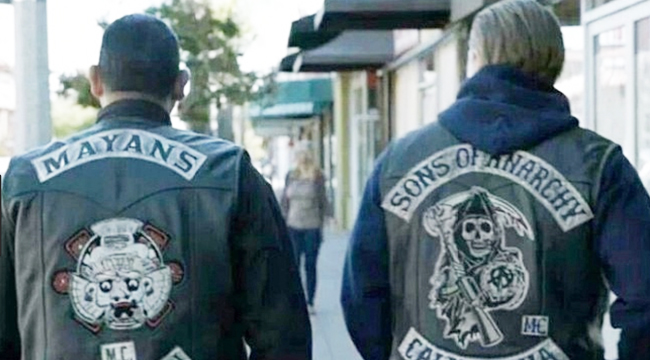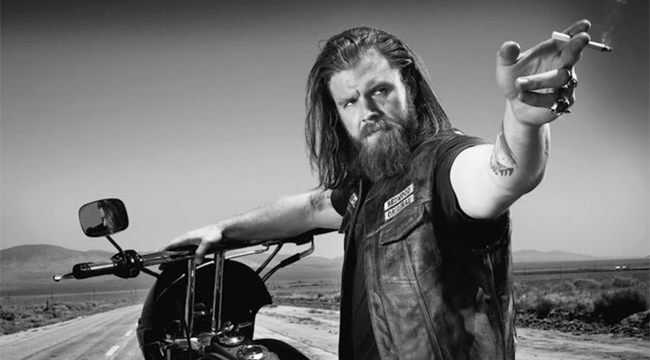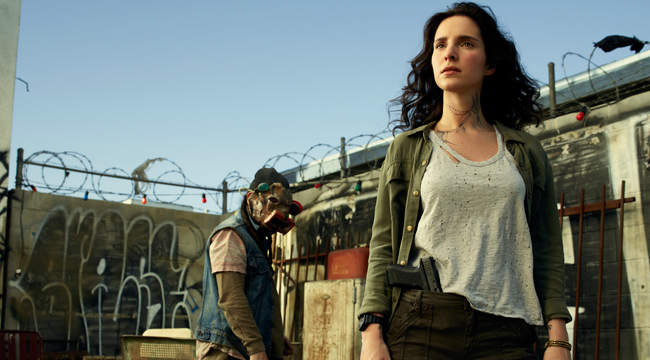
As Kurt Sutter makes his return to FX with Mayans M.C. (on Tuesday, Sept. 4), the newest chapter in his biker-drama universe, he does so with ten years of perspective from his Sons of Anarchy showrunner debut. Prior to those seven seasons of success, Sutter moved up from staff writer to executive producer of The Shield, and after pulling the plug following one season of The Bastard Executioner, he hopes to extend his most beloved mythology in a post-Jax Teller world. Expectations and pressure are both running high as hell, but the notoriously filterless storyteller is keeping it all in perspective.
Sutter was gracious enough to speak at length with Uproxx about his hopes for Mayans, which (from the looks of the first part of the season) is a worthy followup and, in many ways, a more advanced chapter of the saga. During the discussion, he tells us why he’d never erase his past mistakes, why there can be no Gemma in Mayans, and the surreal experience of making one of the most bonkers and depraved scenes in Sons of Anarchy history.
What advice would season 1 of Mayans M.C. Kurt give to season 1 of Sons of Anarchy Kurt?
Let’s see. You know I had the experience of The Shield going into Sons, but I never ran a show before then, so I was driven by a lot more fear, and a sense of feeling like a lot was out of my control. And obviously, I stumbled and made mistakes and set fires and blew shit up, but the reality of it is — and not to sound esoteric — but all that shit shaped the show. It shaped my growth within the process, so I would be afraid to give myself any advice for fear that I would undermine any ugly and sort of clumsy process I may have had.
What I learned from Sons in hindsight is that when you’re beginning a project, and you don’t know what it is, and how it’s going to be perceived, you’re only driven by the sense of needing to tell a story. And in hindsight, you can look back and say, “Oh, the show was successful because of X.” Strong female characters, dark sense of humor, whatever, right? All that shit is a result of not having those parameters and those boxes where you think you need to check off to be successful. And coming into Mayans, which is a similar world, a similar process, it’s difficult to not look at the things that worked in Sons and go, “Oh, I should do that.” And I learned in that process that it’s a continuing sense of education in that, “Wait a minute, I didn’t know any of that shit” going into Sons. And because I didn’t know any of that shit, that shit happened.
So I really have to create that environment for myself in Mayans, and not necessarily think in terms of what I had to do to make it work. I had to put myself in that same sort of naive mindset, creatively, so I didn’t think in terms of what I needed to achieve. Like I could just tell the stories I needed to tell, and then trust that at some point, I could step back and say, “Oh, that worked.”

It feels like a returning audience can be a blessing and a curse.
Oh yeah, absolutely.
Given that comparisons between these two chapters are necessary and inevitable, how do you deal with the pressure from existing expectations?
One of the most important roles I have in the show right now is that ultimately I want to allow Elgin [James, co-creator] and other voices to help create what this show becomes, so that it doesn’t necessarily become my vision, but a collaboration. I feel like my job, if we’re allowed to continue, will be to handle that transition. So how do I honor the mythology that we’re spinning off of, that people spend seven years working very hard at, creating this thing, how do I honor all that work and love? And the audience that came with it — how do I bring them along, so it feels familiar enough, so they are like, “Oh yeah, this is why I watched Sons“? And yet not have it be derivative or just the brown version of Sons? So creatively, how do I have it be unique, compelling, and exciting, and yet familiar enough for Sons fans don’t go, “Oh this isn’t why I watched Sons.” So that’s really the balancing act that I’m trying to maintain right now. And what I hope happens at some point, yes, is that the world of Sons of Anarchy and that club and that mythology will be in the atmosphere, but Mayans won’t be perceived as happening because of Sons but as its own thing. And that any comparisons or misses or any perceived opinions of what it might be or what it might become go away, and people just show up for what it is.
Well, you’re certainly ramping up the bloody and brutal treatment very quickly. And it got me thinking about all the characters you’ve killed off during your TV career.
[Laughs.]
Some of them were very beloved. Have you mourned any more than others?
Not to be goofy, but it’s always hard to drown your babies, right? Some of them, I think, earned their deaths. Obviously, of the big deaths in Sons, the one that probably stands out is Opie.
Oh yeah. Oh my god. Opie was a gut-wrenching one.
He was Jax’s Horatio, he was his sounding board. Yet to me, we had done so much to that character, and he’d been through so much, and the way Ryan [Hurst] played him was so sincere and vulnerable, it’s like I just don’t know how the guy showed up at the club anymore. It didn’t make sense, it felt like bullshit. And I knew I didn’t want to just send him away, so I thought it was time for the evolution of this character, and how do we use that to send our hero on a collision course and move that mythology forward?
Because it happened mid-series, it was also a shock and one I still get hate mail about. Like with a character like Gemma at the second-to-last episode, it’s heartbreaking, but the train was so far off the track at that point, so there was the inevitability of, once she stabs Tara in the head, all bets are off. And you saw where it was going, and you almost didn’t process that death because before you know it, you’re done. Whereas Opie’s death sort of lingered, with the audience and on our characters. That one was the right move, storytelling-wise, but for the cast, it was really difficult. So that one was hard. Sad.

Speaking of Gemma, she’s irreplaceable, obviously, but will we see any comparable old ladies from the M.C., or should we expect more from Emily and Adelita?
The first pilot I wrote for Mayans and directed had a matriarch character, and it was a wonderful actress, and ultimately, it didn’t work. And the reason why is I was trying too hard to make her not-Gemma. And so, the writing was two-dimensional, and the character didn’t work. I realized when I took the externals out, like where is my Gemma, or where’s my matriarch, or where are my strong female characters, and the realization is that I didn’t know any of that going into Sons. I just started telling stories, and the authenticity of the world and the actors playing those roles brought the gravitas to that and created those strong characters and that powerful mama-bear matriarch. But there was no agenda, so I realized I couldn’t set that set that agenda for Mayans, or I was fucked.
But once I took those parameters off, I had these two female characters that were navigating in a very violent, male-driven environment on both sides of the border. And as a result, as the season progressed, and what I feel like has happened after seeing most of the episodes now, is that we’ve created those strong characters as a result of completely different circumstances. And yes, they are not Gemma. They don’t have the historical, experiential gravitas of Gemma, who had been through it all and knew how to pull the strings. They’re not there yet, but it’s sort of interesting to me to see what Gemma looked like during those first two years she was married to John Teller. So we almost get to see the creation of that energy and power through these other two characters. So we end up with these two strong, motivated women in this male-dominated world that have some of the same characteristics as Gemma but are completely different women and are completely different characters as a result.

You brought on Elgin as a co-creator because he understands Latino culture. And you once spoke on the difficulty of writing the Southpaw script and not having that “total control” with a feature. Was it hard to give up ultimate control with having a co-creator on Mayans?
No, that’s a whole different thing. Because what happens with movies is that you turn in that script, and then potentially, unless you’re a producer, you’re basically done. And then it becomes the ownership of other people, and then they turn it into whatever they think it should be. And that’s hard for me. Because I invest, perhaps to a degree that is detrimental to my sanity. But that wasn’t the case with Elgin. Really, I knew that creatively it made sense to be working with someone of color, someone of Elgin’s really compelling background and story. I needed that energy, so it wasn’t really giving up control, but more how do I take the ideas that I have and sit down with someone else and make them better? Because the truth is that in any creative dynamic where you’re really collaborating, that creative discourse is all about push and pull and having people challenge your ideas. And as a result of that, I believe that the best ideas sort of come to the surface.
I think we had the same perspective and some of the same demons, but Elgin just sees things through a completely different lens than I do. When we were breaking the story for the pilot, I had a really good sense of who EZ was and the M.C. world, but the whole rebel angle, and the Forgotten Children, a lot of that came out of his brain. And I do know that I would not have been able to find that. I could have gotten that research, but to have Elgin, who really has the sense of the downtrodden, the neglected, the people who never had a voice, he just looked at that story and that reality in a lot of the border communities where the fucking cartel has been in the power for so long that it’s the oppressor. And it’s based on real shit happening in several Central American countries.
This final question, you may not like it, but I appreciate that you don’t have a filter, so I’m gonna ask this in honor of that … How many times did you shoot the scene in Sons where Otto [played by Kurt Sutter] chews off his own tongue?
[Laughs] You know, it was such a dark fucking scene, but there were so many technical pieces to that scene, because it was a stunt.
It was glorious, actually!
It was a prosthetic tongue, and it had blood pellets in it, and I had to slam … there were so many pieces of it to make it work, and then throwing it at the fucking window, we had it on a fish line, so it would hit the window. So it was done in pieces quite a bit, it’s hard to even remember the emotionality of it because it was so fucking weird and technical. And I just remember Donal Logue on the other side of the glass, just looking at me like, you know, “Look at this shit we get to show up and do every day.” But I only remember that it was like, “We need another tongue, not enough blood.”
Alright, I’ll think of a number in my head and keep it to myself.
[Chuckles] Alright, thank you. I appreciate it.
This interview has been edited and condensed for clarity and length.






